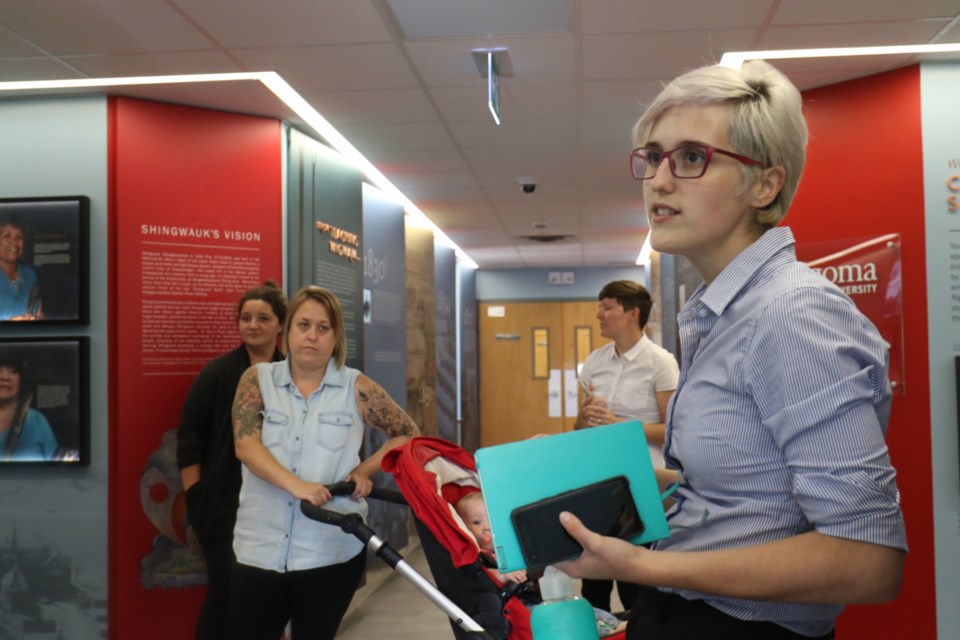A pretty frank discussion happened on the campus of Algoma University Tuesday afternoon, as Indigenous and non-Indigenous people got together to talk about reconciliation as part of the Algoma University Archives’ community dialogue sessions.
For one participant, just going to an Indigenous cultural event can be a somewhat intimidating experience.
“Even when there’s like, pow wows - I used to live very close to Thessalon First Nation - and there would be these huge signs up,” the participant told the discussion group. “But it never said, ‘everyone welcome.’”
“I never went.”
In another instance, a participant told the group that there’s a general sense of fatigue throughout mainstream Canada when it comes to talking about Indigenous issues, citing the proliferation of Indigenous issues on CBC Radio as an example.
“People are starting to get tired of it,” said the participant.
Another participant chimed in, telling the small group that frequently hearing about the injustices historically suffered by Indigenous people “feels like a lecture.”
“I think part of it is how do you get, you know, this demographic of folks to acknowledge those histories and be uncomfortable and sit in that discomfort, but learn to view that discomfort as something proactive,” another participant replied.
It’s this type of open - and at times, brutally honest - dialogue that facilitator Skylee-Storm Hogan wants people in Sault Ste. Marie to engage in.
Hogan, who is part Irish and part Haudenosaunee, has been a student at Algoma University for the past four years, studying law, political science and Indigenous education.
Hogan will soon be attending Western University, where she’ll pursuing her masters in public history.
She wants to continue working with the public in discussing Indigenous history and “un-politicized” Canadian history, much like the community dialogue sessions that have been taking place in the city following the opening of the Reclaiming Shingwauk Hall exhibit earlier this month.
Hogan says the sessions - funded by a grant through the Inspirit ChangeUp program - will hopefully provide some Saultites with a means to change harmful, pre-existing narratives.
“Those things are so important in the community of Sault Ste. Marie, that has been impacted so heavily by residential schools, having two in the immediate area, and being surrounded by First Nations,” Hogan said. “We felt that the conversations were really important to have, not only with members of the Indigenous community, but members of the Sault community as a whole to really understand what everyone’s thoughts are on reconciliation, and what everyone’s thoughts are on where we are at, and where we can go.”
Hogan referenced a point in the dialogue sessions where a participant admitted that she was intimidated by taking part in Indigenous events.
She says that it’s sentiments like those that can be used as an effective springboard for conversation.
“It made me really intrigued, because it got me to kind of examine that person’s feelings for why they felt so intimidated, why they didn’t feel welcome,” Hogan said. “It got me to have that discussion of, ‘well, that’s how a lot of Indigenous people feel daily, the way that you felt.’”
After the dialogue session concluded, Hogan and Shingwauk Residential Schools Centre curator Krista McCracken took participants on a tour of the Reclaiming Shingwauk Hall.
Before setting foot into the exhibit, SooToday asked participant Laurie Zeppa what surprised her the most during the community dialogue session.
“I think for me, the fact that people don’t realize there’s residential school history right here in our community, that’s the biggest surprise,” Zeppa said. “I’m surprised by that.”
Zeppa says the dialogue sessions serve as a “good starting point” in terms of building an inclusive, understanding community.
“I think it’s a start to building a community that understands and appreciates not only the Indigenous cultures, but other cultures too,” Zeppa said.
Meanwhile, Hogan says that some conversation surrounding reconciliation can be uncomfortable, but is necessary in order to move forward.
“I think really just talking to each other, understanding that we’re not always going to understand each other, and that’s OK,” Hogan said. “Understanding that a lot of what we’ve been taught to know as history, what we’ve been taught to know as cultural may be, in fact, informed by archaic belief systems, might be informed by moralities that are no longer relevant or that are harmful to members of our society, and we maybe have to just re-examine why we believe certain things.”
The community dialogue sessions wrap up Wednesday evening at the Sault Ste. Marie Indian Friendship Centre.
